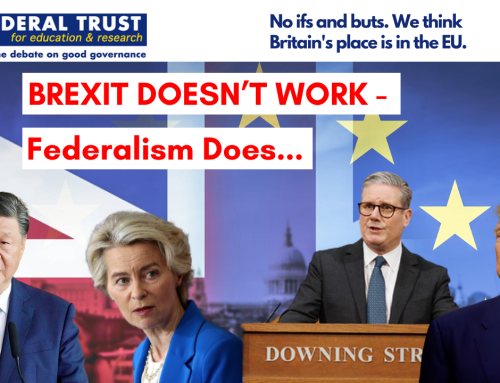The EU has initiated a new industry strategy designed to enhance the bloc’s health crisis management, to achieve greater Single Market integration and to secure strategic autonomy in managing risks. This article explores key aspects of this new strategy, while reflecting on associated complexities for UK businesses competing in the EU Single Market.
Earlier this year, the European Commission updated the European Union’s (EU) Industry Strategy, after its launch in March 2020. The global health crisis, which came immediately after, inadvertently highlighted the interdependence of the EU’s Single Market with global supply chains. The pandemic also illustrated the need for the EU to embrace more vigorously the transition towards a cleaner, more digital, and more resilient economic and industrial model. Another new aspect of the Commission’s approach to industrial governance is “strategic autonomy” which mainly entails dealing with foreign government subsidies for local businesses active inside the Single Market.
Impact of Covid-19 and Brexit on EU and UK businesses
The global health crisis highlighted the essential need to uphold the free movement of persons, goods, services, and capital within the European Single Market. Border controls, closures and uncoordinated national or regional restrictions as well as containment measures restricting the free movement of persons, often subject to frequent adjustments, drove up uncertainty and costs of compliance. Border disruption also caused serious delays and led to breakdowns of supply chains in many industrial ecosystems. For the UK, in particular, border disruptions with the EU are still very evident in crossborder trade – and magnified even more due to the impact of Brexit.
“Over the long run, though, there is a real possibility that UK goods and services providers will find it progressively harder to compete against their EU counterparts, who are set to gain from a more seamless and better financially resourced Single Market.”
The free movement of services across the EU was also affected significantly by the pandemic, resulting in forced temporary closures of non-essential businesses, travel restrictions, and a lack of clarity on applicable rules on movement across borders. Needless to say, Brexit has only compounded the costs and complexities of pandemic-ravaged services trade for UK businesses in the EU.
Dealing with future health crises
Among the more significant measures now proposed by the Commission will be the introduction of a Single Market Emergency Instrument to provide a structural solution in facilitating the availability and free movement of persons, goods and services in any future health crises. The Instrument will guarantee more information sharing, coordination and solidarity among EU member states when adopting crisis-related measures. It should also build a mechanism for addressing critical product shortages by speeding up product availability. These include standard setting and sharing, fast-track conformity assessment, and reinforcing public procurement cooperation.
The Commission will continue to expand the single European market for capital. For example, to address the solvency risk affecting small and medium enterprises (SMEs) from future pandemic-related economic shutdowns, there will be dedicated capital support for SMEs in the form of financial products under the Invest-EU programme. The Commission is also accelerating work on equity funding for SMEs, work that will trigger investments in green and digital technologies across all stages of an SME’s life. A new public-private IPO Fund will support SMEs and midcaps through and beyond the listing process.
“The UK has yet to define a similar policy on global economic strategic resilience, due to its preoccupation with Brexit. It will not in any event be able to derive the economies of scale open to the EU.”
How these new measures will bear in the short term upon UK industry as it struggles to deal with the lingering economic impact of the pandemic and worsening supply chain disruptions remains to be seen. Over the long run, though, there is a real possibility that UK goods and services providers will find it progressively harder to compete against their EU counterparts, who are set to gain from a more seamless and better financially resourced Single Market.
Applying strategic autonomy in practice
There has been considerable debate over the need for the EU to become more independent both economically and technologically. As a response, the Commission has analysed ‘strategic dependencies’ in six areas: raw materials, batteries, active pharmaceutical ingredients, hydrogen, semiconductors, cloud and edge computing technology.
New measures will be taken to achieve strategic autonomy via diversifying international supply chains and securing key international alliances and partnerships. This would especially involve higher-end technologies such as semiconductors and processors, cloud and edge computing, industrial data, zero emission aviation and space launchers.
In aid of building strategic resilience in these areas, the Commission highlights the merits of EU enlargement, expansion of its eastern and southern neighbourhood policy and growing its network of free trade agreements with other countries. Efforts will also be made to help micro-enterprises and SMEs deal with disruptions and vulnerabilities.
Strategic autonomy is, therefore, a key element of the EU’s industrial strategy. This strategy embraces multiple stakeholders. EU bodies and national governments will need to cooperate closely with numerous players in the business sector. The scale of such an undertaking will be significant, but nonetheless manageable, given the large number of well-resourced institutional players involved.
“The UK is no less at risk than the EU from similar unfair competition. But, as a considerably smaller economy than the EU’s and acting as a single power in the wake of Brexit, the UK’s capacity to introduce a similar policy against foreign subsidy is less than the EU’s. Britain would be much more likely to suffer retaliation from an affected government than would the great trading bloc of the EU.”
The UK has yet to define a similar policy on global economic strategic resilience, due to its preoccupation with Brexit. It will not in any event be able to derive the economies of scale open to the EU. Inevitably, even if the UK were to embark upon its own policy of strategic autonomy, its resource constraints would probably leave it exposed to global forces that determine the development of cross-border supply chains.
Tackling foreign subsidies
Alongside the updated industry strategy, the Commission has proposed challenging foreign subsidies that cause distortions and harm the level playing field in the Single Market. According to the Internal Market Commissioner, Thierry Breton, “we are closing a gap in our rule book to make sure that all companies compete on an equal footing and that no one can undermine the level playing field and Europe’s competitiveness with distortive foreign subsidies”.
Under its proposals, the Commission will have the power to investigate aid granted by external public authorities which benefit companies economically active in the EU and redress their distortive effects. For example, a foreign-owned company acquiring EU-based businesses or bidding for public contracts will be required to notify any relevant financial contribution received from a non-EU government. Where an overseas owned business does not notify a subsidy that breaches the required criteria, the Commission may impose fines and review the transaction.
The Commission will also be empowered to investigate specific types of activities, such as greenfield investments or procurements below qualifying thresholds, when it suspects that a foreign subsidy may be involved. Some of the corrective actions to be imposed could include divestments of certain assets or the prohibition of certain market behaviours. In case of notified transactions, the Commission will also have the power to prohibit the subsidised acquisition or the award of the public procurement contract to the subsidised bidder.
The UK is no less at risk than the EU from similar unfair competition. But, as a considerably smaller economy than the EU’s and acting as a single power in the wake of Brexit, the UK’s capacity to introduce a similar policy against foreign subsidy is less than the EU’s. Britain would be much more likely to suffer retaliation from an affected government than would the great trading bloc of the EU.
Further Reading
European Commission – European industrial strategy
https://ec.europa.eu/info/strategy/priorities-2019-2024/europe-fit-digital-age/european-industrial-strategy_en
The EU Industrial Strategy: Towards a Post-Growth Agenda?
https://www.intereconomics.eu/contents/year/2021/number/3/article/the-eu-industrial-strategy-towards-a-post-growth-agenda.html







Leave A Comment